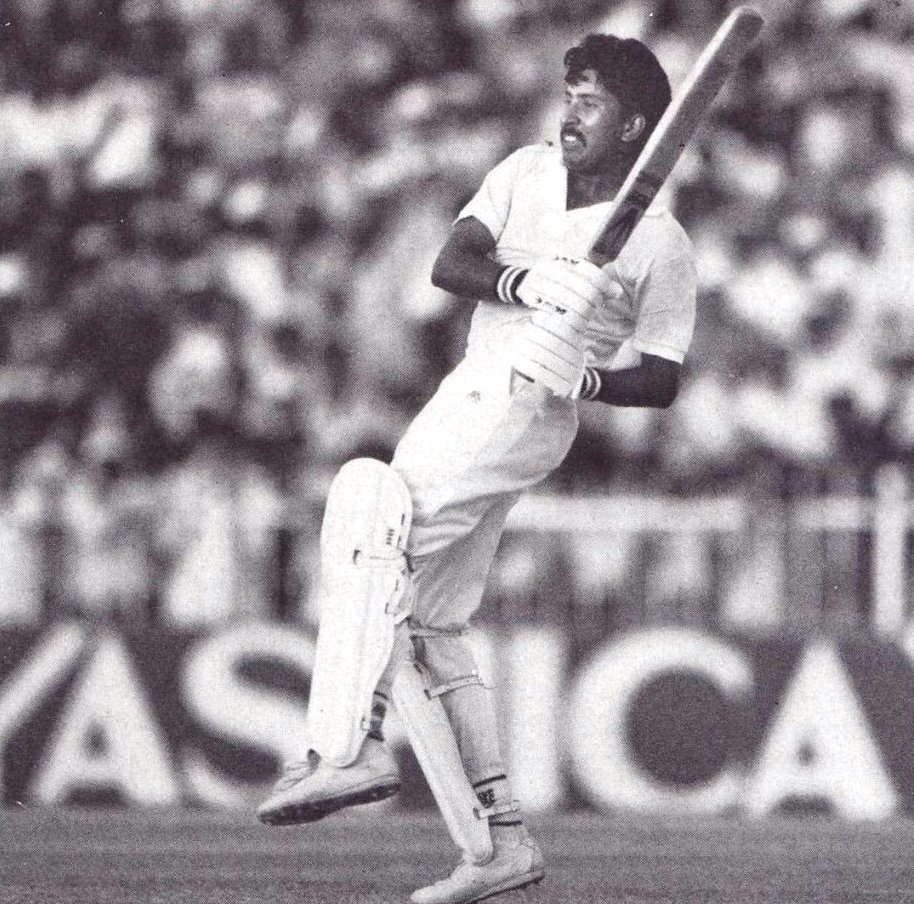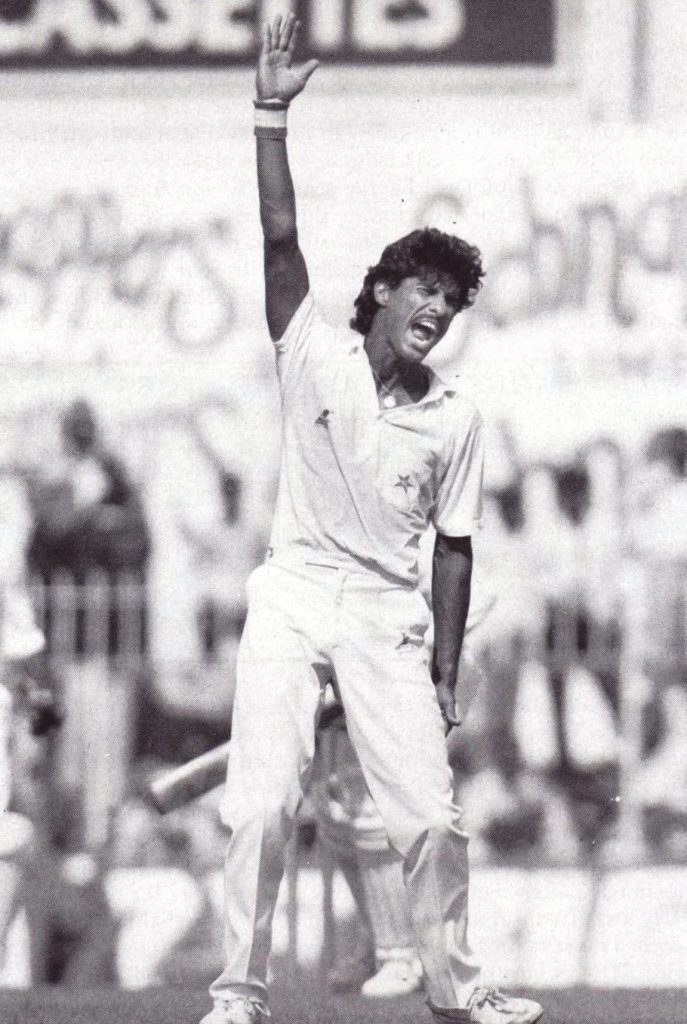PAKISTAN v INDIA FIRST TEST MATCH Karachi 1989 November 15, 16, 17, 19, 20. The Indian batsmen, who had struggled in the first inning, applied themselves better the second time around to save this first match of the four-test series. Most of the Indians were playing for nothing, having rejected their board’s tour-pay offer as too small.
Only the three players new to touring—Salil Ankola, Sachin Tendulkar, and Vivek Razdan—had accepted their fees. The first two of that trio made their Test debuts at Karachi, with Tendulkar becoming, at 16 years and 205 days, the youngest Indian and the fourth-youngest player from anywhere to appear in a Test. India’s side bore an unfamiliar look, with Amarnath, Duleep Vengsarkar, and Chetan Sharma missing from the team that had reached the Nehru Cup semi-finals.
Pakistan also introduced two players new to Tests: all-rounder Shahid Saeed and fast bowler Waqar Younis, whose 18th birthday fell on the first day of the match. The umpires for this match were the English pair of John Hampshire and John Holder. They were scheduled to stand in all four tests, the first time that ‘neutral’ umpires would officiate throughout a series.
By and large, the umpires had a quiet match, although they felt obliged to report a fourth-day incident between batsman Salim Malik and wicketkeeper Kiran Moré to the Pakistan Board and the two team managers. Srikanth was captaining India for the first time in a Test, but Pakistan’s pace-bowling find, Waqar Younis, made his Test debut on his 18th birthday.
He took 4 for 80 in India’s first inning but missed most of the second inning with a back strain. Pakistan was rewarded when Aamer Malik fell without scoring to Kapil Dev, who was playing in his 100th Test. Before Ravi Shastri was able to catch the opener at slip after the ball had first rebounded from Kapil Dev’s grasp, Rameez Raja and Shoaib Muhammad put on 79 runs.
Salim Malik made 36 in attractive style before falling to Ankola, becoming the Maharashtra paceman’s first Test wicket. Miandad, uncertain at first, survived the rest of the day, hitting eight fours in his unbeaten 76, and by stumps, Pakistan had reached 259 for 4, with Imran (17) being the other not-out batsman. A spectator ran onto the field on the first day with the intention of assaulting one or more of the Indian players.
The Pakistani, protesting about recent killings of Muslims in the Indian province of Bihar, menaced Kapil Dev and was involved in a scuffle with Srikanth and some of the other players, the captain’s shirt being torn in the mélée. Kapil Dev, using the second new ball, quickly accounted for Javed Miandad on the second morning to become the fourth bowler to claim 350 Test wickets.
After the debutant Shahid Saeed went cheaply, Imran Khan and Saleem Yousaf shared a stand of 91, with the captain going on to his fifth Test century (third against India). In all, he batted for 201 minutes and hit 17 fours and a six. Manoj Prabhakar, playing his first Test for nearly five years, mopped up the tail with a spell of 4 for 6 in 17 balls, finishing with Test-best figures of 5 for 104.
All 10 batsmen were out caught, and Muhammad Azharuddin equaled the Australian Victor Richardson and his fellow countryman Yajurvindra Singh’s Test record by taking five catches. Pakistan’s total of 409 looked imposing enough, and when India slumped to 41 for 4—all four batsmen failing to reach double figures—the home side seemed set for a comfortable victory.
Wasim Akram and the impressive Waqar Younis were successful bowlers. 16-year-old Tendulkar had a torrid introduction to Test cricket but hit out for 15 before he too fell to Waqar Younis, and when Muhammad Azharuddin went for 35, India was still deep in trouble at 85 for 6. All-rounders Ravi Shastri (25) and Kapil Dev (49) responded with an attacking stand that took India to 157 for 6, still 252 behind by the close.
Although Kapil Dev, having scored 55 from 50 balls, perished to an unworthy shot early on the third day, a stubborn innings of 58 from Kiran Moré, his highest in Tests, saw India past the follow-on target. Wasim Akram took two late wickets to finish with four, as did Waqar Younis. Pakistan made a hesitant start as they looked to build on their lead of 147.
Rameez Raja and Aamer Malik went cheaply, and although Javed Miandad looked in better form than in the first inning, he was out just before the close for 36, having passed Clive Lloyd’s Test aggregate of 7515 runs when he had made 16. By stumps, Pakistan was 106 for 3, with Shoaib 46 and night-watchman Saleem Yousaf 3. When play resumed after the rest day, Shoaib dropped anchor, remaining scoreless for an hour.
He eventually reached his half-century in 231 minutes, at which point he speeded up a little, eventually departing in tears after being adjudged Ibw to Kapil Dev for 95. After the early loss of Yousaf, most of the action came from Salim Malik, who reached his seventh Test century (third against India) in 216 minutes, with 13 fours, just before tea.
Imran Khan, who had helped Salim Malik add 55 in the last eight over’s before the interval, then declared, leaving India the improbable task of scoring 453 in a minimum of 102 over’s to win. Srikanth scored 31 of the first 43 runs before he was given out to Wasim Akram; the Indian captain departed, indicating that he had hit the ball.
Navjot Singh Sidhu, despite a close call when he was nearly run out, and Sanjay Manjrekar survived to the close, scoring 34 and 14, respectively, in India’s 86 for 1. The fact that Younis was not present because of a back strain made their task easier. Younis was able to bowl only two over’s on the final day, and without him, Pakistan never looked likely to force victory.
Sidhu, dropped by wicketkeeper Salim Yousaf and then by Salim Malik at slip, rode his luck to reach 85, adding 135 for the second wicket with Manjrekar, a new record for India against Pakistan (previously 125, by Gavaskar and Amarnath at Pakistan’s Hyderabad in 1982-83). Sanjay Manjrekar, playing in only his sixth Test, went on to reach his second century soon after tea, by which time India was safe.
Sanjay Manjrekar batted for 319 minutes in all, hitting 13 fours, and he shared a breezy partnership of 78 in 85 minutes with Azharuddin, who eventually fell for 35, top-edging Salim Malik, who hit his seventh Test century at Karachi with a reverse-sweep into the hands of Aamer Malik, who had taken over behind the stumps in place of the injured Yousaf.
So India survived to fight another day, but their task in the remaining three Tests looked to be an exceedingly difficult one. Pakistan’s only worries concerned the indifferent form of their opening batsmen and the patchy performance of Abdul Qadir, who never seems to bowl at his best against the Indians.



